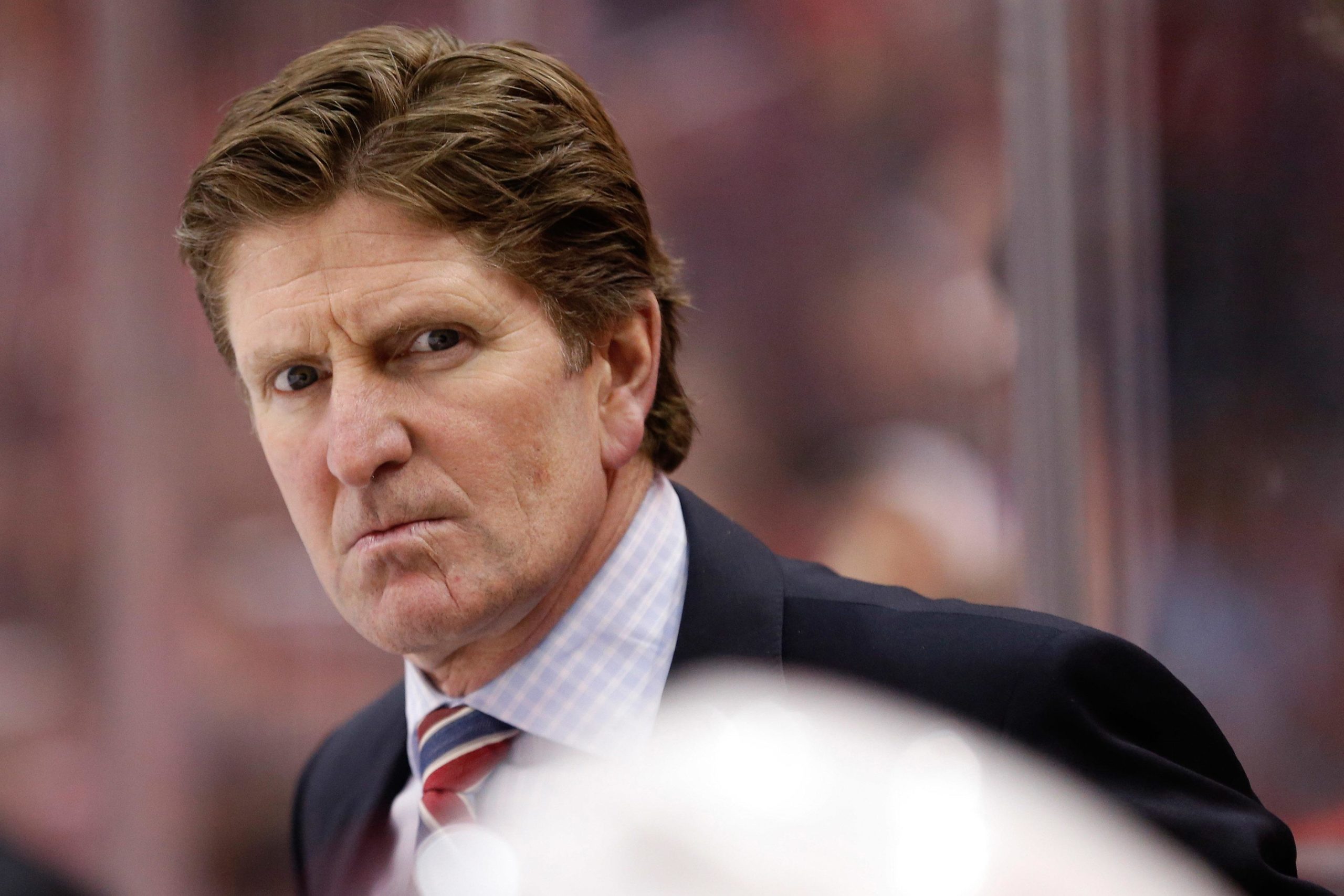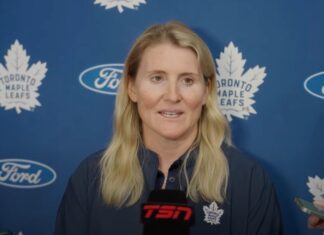Mike Babcock joined Mike Richards In The Morning to discuss expectations for training camp and the upcoming season, the difficulty of replacing Phil Kessel’s offence, and more.
Mike Richards: When you look at the things you want to do; you’re in a new environment, you’re talking to players, some you’re going to coach for the first time. Where do you start with a project like this? I assume there’s so much on your list, but you’ve got to do one thing at a time.
Mike Babcock: I think the biggest thing that’s happened here is the building of a management team; the building of an off-ice management group. That comes from scouts, that comes from medical science people, it comes from the President, the manager, the coaching staff. Putting together those people that are a quality, good people that will work hard and set a good example and give stability to the organization. And then the next step is to get on with fixing our on-ice product. I think we’ve had a real good summer off the ice. Now we’ve got to start our journey on the ice. July 1st – that area went alright for us, we acquired some players. We’re going to try to build a product here that people can be proud of. It’s going to take us time. I think we’re all aware of that. In the meantime, we want to be the best we can possibly be and give our fans something to be excited about.
Richards: Coach, what about individually? Is it via interview where you start to get a feel for guys that essentially you didn’t know before?
Babcock: What I did is I called everybody. Those conversations were really straightforward in the fact that they were just hello; nothing more. I’ve had a chance to stay around here for a bit, bump into guys, and then we’re going to pick ‘em off one at a time. But in the end those are conversations. I’ve got to get to know them as players and as people. You know what? As a coach, I’m real straightforward with this. I try never to confuse player and the person. I think it’s really important to love your players and give them all the support you can and get to know them as people, but in the end that’s not what gets them on the ice. What gets them on the ice is how they play on the ice. You do good things out there? You get out there more. We’re going to get to know each other as training camp goes on. We’re going to start off by establishing structure and work ethic at our camp, and then we’re going to try to get better each and every day. That’s basically what we’re doing, is we’re going to get to know each other better.
I
Darren Dreger: A year ago, Mike, Brendan Shanahan and company used a phrase, “internal competition,” to describe the reality of that season. They wanted to make sure not just that will to compete but that internal fight was there. It was in practice, it was in every shift of the exhibition season and obviously into the regular season. To a degree, I think that worked. I think we saw players who battled for their spots and maybe pushed one or two that were a bit of a surprise out of the way. Do you follow along that same path this year? And is it even more wide open given some of the young talent you’re obliged to have a good look at?
Babcock: I think the big thing here is internal competition. To me, internal competition comes with the more skill you have in your lineup. You don’t know from day to day who is going to get that extra ice time because you have so many good players. That’s what you want to get to. You want to get to a spot where there is a tonne of competition for jobs. Training camp, for me, is real simple. It’s an individual time of year. Training camp ends when exhibition is done. What you’re trying to do is you’re trying to secure yourself a job on the team. If you’re a guy who has a job on the team, you’re trying to secure yourself a job on the powerplay or the penalty kill, or you want to be out there 6 on 5 or 5 on 6. There’s a lot of things to be determined here through training camp because we don’t know who they are; they’re getting to know us, we’re getting to know them. The more internal competition you have the better off you’re going to be because it’s a competitive environment every day. You want that in your weight room, you want that on your pingpong table, you want that playing cards on the plane; you want it everywhere. You want it to be a competitive environment that’s a lot of fun. In saying that, the more quality players you have the more internal competition you have. If you don’t have enough quality players, it makes it harder to have as much internal competition.
I
Dreger: Assuming that you’ve got a higher quality of player, then you’re going to expect the offence that was moved out in the Phil Kessel trade to Pittsburgh Penguins to be replaced by committee? That 25-40 when Phil is going should be replaced by a few players, or is it up to guys like Nazem Kadri and the obvious to step up?
Babcock: I would tell you – any time you move a guy like Phil, who is a high-high end scorer, you’re going to suffer to replace his goals. That’s just the reality of the situation. But you’re going to see who is going to do it. We did an exercise each year in Detroit. Ken Holland and myself, we add up the goals we’re going to score. We’d know before the year what we thought we were going to score. When I added up the goals the other day, they didn’t add up right. I tried to do it again and again, and I didn’t like the outcome. The reality is we’re going to have to find some people to score more goals than I put down on the sheet. We know that. Let’s get to work and figure out how we’re going to do that.
Richards: Mike, you talk about learning curves, headaches, a slow process, and everything like that. What, in your mind, will it take for your team — as a first year coach on this team — for this organization, this season, to be deemed successful in your mind? What will it take, for you, for this team to be successful?
Babcock: That’s a great question. I’m not going to say anything right now except the fact that we’re going to compete hard and we’re going to get better each and every day and we’re going to figure out what we’ve got here. Is there a number of games we got to win, is what I think you’re trying to get me to say and hold something to it? The first three comments you said – I don’t even know if I said ‘em. That’s just how radio works. The reality is we’re going to come to work and we’re going to get better. Where that takes us, I don’t know. Is this is a process that is going to take some time? Absolutely. But I think all these questions – let’s do this in four weeks from now. I think four weeks from now I’m going to have better answers for you. Right now, I don’t know the answers.
Richards: When you look at where you come from, what you’ve learned and where you’re at now, what were some of the influences for you, as a coach? Who did you look at?
Babcock: For me, the two biggest influences in my life were my folks. Real straight forward: I learned how to work hard from my dad and I learned how to talk to people from my mom, but there’s been lots of people over the years who have had influence on me, whether that be players I coached or guys around him. You talk about John Wooden and Coach K [Mike Krzyzewsk]; they have not only established themselves as great, great coaches, but as great people. To me, that is a huge priority, is setting a standard that your players can be proud of you in how you handle yourself each and every day, and the expectation you have for them. They know it’s consistent. They know you’re a good person. They know you’re pulling for them. That’s what I try to do. To give you a guy right here, right now, I don’t have one. I know it was great for me to be out with Jacques Lemaire last night, just talking to Jacques with our coaches; he’s a good man. Scotty Bowman was a good man to me. Dave King was a good man to me for a lot of years. There were lots of people along the way.

































